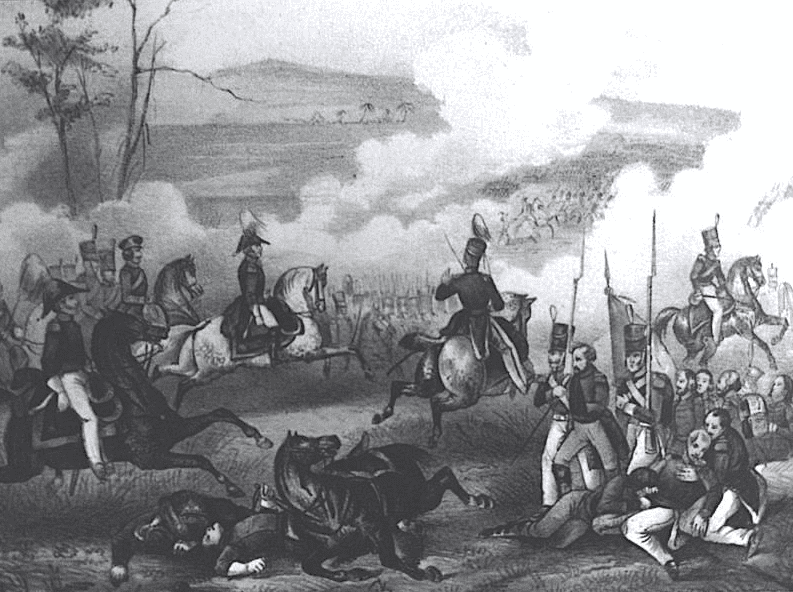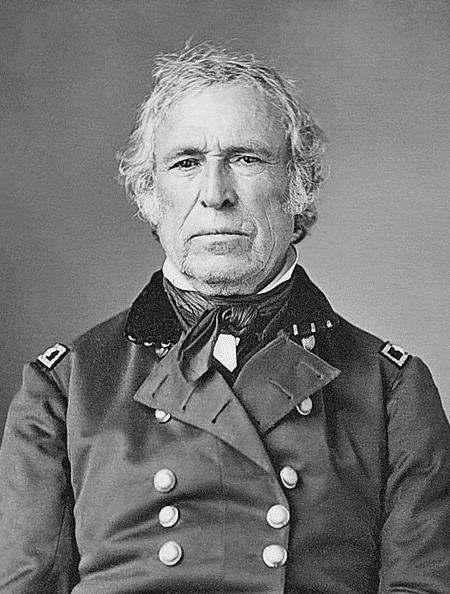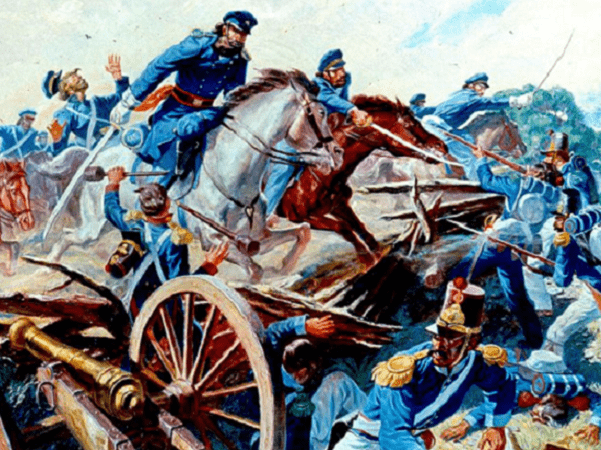At the urging of President James K. Polk, the U.S. Congress declared war on Mexico on 13 May 1846, beginning the bloody two-year war of expansion known as the Mexican-American War. Polk was a strong supporter of “Manifest Destiny” – the belief that America had a divine right to expand its territory from the Atlantic to the Pacific Oceans – and he was not going to allow Mexico to stand in his way. In fact, the case could be made that he illegally started the war by invading Mexican territory under the guise that it was the disputed border region of Texas.

Mexico regarded Texas as a renegade province even after the 1836 Texas Revolution established the Republic of Texas, and warned the United States not to annex the territory. However, the United States defied Mexico and admitted Texas into the Union on 29 December 1845. Mexico retaliated by breaking off diplomatic relations.
Then, the United States claimed that the southern border of Texas was the Rio Grande River, ignoring Mexico’s long-established Texas border at the Nueces River 150 miles north. President Polk, without congressional authorization, ordered American troops under General Zachary Taylor to march down to the Rio Grande, ostensibly to “protect” the Texas border, but in reality to cause a provocation – which Mexico provided. The Americans knew full well that Mexico would consider Taylor’s soldiers to be invading Mexican territory.

On 25 April 1846, a detachment of 67 American soldiers, led by Captain Seth Thornton, was out on patrol to see if Mexican troops had crossed the Rio Grande. They had, and a battle ensued. This was all the excuse President Polk needed. On May 11, his message to Congress complained that a belligerent Mexico had “shed American blood upon American soil,” and asked for a declaration of war. Two days later, Congress obliged, and the Mexican-American War was officially underway.
Most of the U.S. Congress, the press, and the public enthusiastically supported the war against Mexico. “Manifest Destiny” was all the rage – but support for the war was not unanimous. Some critics were deeply troubled by Polk’s actions, and felt the war amounted to little more than a murderous land grab of another nation’s territory.
The following three newspaper editorials all express opposition to the war, in the strongest terms. The first one, ironically printed on the very day Congress declared war on Mexico, was written before the paper received word of President Polk’s May 11th address demanding that Congress declare war. This editorial focuses on how President Polk, without congressional authority, was deliberately sending American troops into harm’s way, invading a sovereign nation in hopes of provoking an aggressive response that would trigger war.
Here is a transcription of this article:
WAR WITH MEXICO.
The accounts which may be found in this day’s paper, present an alarming state of things. Infinite diversity and confusion prevail in the advices from the seat of difficulties, and yet some conclusions appear certain from those accounts. There is no doubt that the Mexicans have crossed the River and have placed Gen. Taylor’s troops in great peril; and it is also authenticated that some of our officers and men have been cut off, while out on duty, and their fate has probably been the worst. It appears that great excitement exists in New Orleans. The legislature of Louisiana has voted one hundred thousand dollars for the emergency and troops were raised at the shortest notice in New Orleans. Another week will doubtless bring more decisive advices.
It is a remarkable circumstance attending this condition of our affairs, that we find ourselves on the verge of a war, and in the midst of battles already, and yet not a word has the country or Congress heard from the President of the United States. He dispatched his forces, last winter, upon his own responsibility, to the borders of Mexico; he ordered them to cross the disputed line of territorial boundary and to erect their batteries in a country which Mexico has never admitted to be a part of Texas, but has always claimed as a part of her own domain; and all this, within sight of a hostile army of Mexico threatening to dispute our progress – without as much as saying one word to the two Houses of Congress. The money and the peace of the country are handled by the Executive as if war was a trifling matter; and revenue, and peace, and human life a minor consideration.
Such is one of the opening scenes of the administration of Mr. Polk. The issue is yet to be seen.
This second editorial also expresses concern about the actions of President Polk.
Here is a transcription of this article:
WAR WITH MEXICO DECLARED!
Our readers will learn, nine-tenths of them with well-founded alarm and dismay, that the Congress of the United States have adopted the War with the Republic of Mexico, in which the President has, without their consent or authority, involved the country; and that all the best interests of this People are staked upon the hazard of the die. We do not mean of course the hazard of a fierce and bloody War with Mexico, though that will in all probability be found to be no child’s play; but the imminent hazard of bringing on a general War, by which, even in the heated imaginations of those who look upon War as synonymous with Glory, we cannot expect to be gainers, but inevitably and enormously losers in every sense, the entire destruction of our widely extended commerce being among the smallest of the items to be taken into the estimate.
But the loss far more to be deplored than the highest aggregate of all such losses, is that to which we find ourselves exposed by this additional evidence of the feebleness of the Constitution of the United States, which has already become a mere dead letter whenever it comes in conflict with Executive power, or a party purpose in Congress.
This is not the time, however, to pursue with the requisite calmness the train of thought into which the events of the two last days are calculated to lead us. The mischief is done: it will now and henceforward be the business of all good men who still retain an interest in public affairs to unite their counsels and their efforts to repair it, so far as repair of it be possible, and to mitigate the evils before us by every means yet in their power.
A large proportion of those Members of both Houses of Congress who voted for the Declaration of War, did so under an idea – wholly erroneous, in our opinion – that, though unnecessary to measures of defense, the Declaration only proclaims a fact. They looked only to the provision of men and money to repel invasion, which, separated from the fatal power now given to the President, would not probably have received a single negative vote. Too late they will find their error, and we shall live to see the day when they will deeply regret having suffered themselves to be deluded or influenced in the manner in which they have been.
This fiery third editorial was published by the New York Tribune and reprinted by the Daily Atlas.
Here is a transcription of this article:
“OUR COUNTRY, RIGHT OR WRONG!”
Such is the spirit in which a portion of the Press, which admits that our treatment of Mexico has been ruffianly and piratical, and that the invasion of her territory by Gen. Taylor is a flagrant outrage, now exhorts our people to rally in all their strength, to lavish their blood and treasure in the vindictive prosecution of war on Mexico. We protest against such counsel, as alike immoral and unwise. It is worthy only of “the fool,” who “hath said in his heart: There is no God.” Whoever has thoughtfully studied history, whoever profoundly realizes that the universe has a Ruler, must condemn the counsels which are now urging our country on to a war against Eternal Justice – a war in which Heaven must take part against us.
But it is said that Mexico has made war upon us. How can this be pretended? Our army was long encamped at Corpus Christi, on the extreme western limit of all that ever was Texas, either the province or the republic. There our flag waved unmolested; not a Mexican came near our little army. Not an act of hostility was committed on either side. All at once, without an imaginable pretext, our army broke up, and marched for the Rio del Norte. It was met by Mexican officers, at several stages on its progress, and warned to desist. On crossing the Nueces, this warning was most emphatically given, with an express notification that a farther advance would be an act of war. Everybody knew that our army had now passed out of Texas into Mexico – into a province of that republic in which no disaffection to the Central Government had ever been evinced. Gen. Taylor knew perfectly well that he was no longer in Texas, but in Mexico. Yet he had no choice but to obey orders. He has since acted with circumspection and forbearance, but it was impossible that he should maintain his position as an invader and not give offence. Pointing his guns at Matamoras, amply within their range, was a plain act of war – and blockading the river, so as to forbid the transmission of stores and provisions, was another. Suppose a foreign army were to be landed on Governor’s Island, its guns trained to bear on our city, and the accompanying fleet to blockade our harbor, cutting off all supplies of provisions, and raising the price of flour to $40 per barrel – does anybody imagine we should wait to ask what was meant? – that we should remain quiet until the invaders should think proper to open their fire? Would it not be the first dictate of every heart to drive them from our soil, and then inquire what they meant by coming here?
Yet Mexico hesitated, inquired, remonstrated, forbore, and at last gave formal notice that if our aggressive measures were persisted in, she would consider War commenced and act accordingly. This she has done. With what face do we now pretend to be surprised, astonished, taken at disadvantage, and, therefore, call out for vengeance on the perfidious, blood-thirsty Mexicans?
Our Government has been utterly wrong in this whole matter, and ought first of all to desist from wrongdoing. Send ten thousand men to the Rio Grande to rescue Gen. Taylor and his little army; but let instructions go with this force for the return of the whole at least to Corpus Christi as early as possible. No true honor, no National benefit, can possibly accrue from an unjust War. We can easily defeat the armies of Mexico, slaughter them by thousands, and pursue them, perhaps, to their Capital; we can conquer and “annex” their territory; but what then? Have the histories of the ruin of Greek and Roman liberty, consequent on such extensions of empire by the sword, no lesson for us? Who believes that a score of victories over Mexico, the “annexation” of half her provinces, will give us more liberty, a purer morality, a more prosperous industry, than we now have? How will the millions, who must ever live by their daily toil, profit by an extension of our sway? They may shout, and hurrah, and dance around the bonfires that will be lighted, the cannon that will roar, in honor of some field of human butchery; but to what end? Is not life miserable enough, comes not death soon enough, without a resort to the hideous enginery of War?
People of the United States! Your rulers are precipitating you into a fathomless abyss of crime and calamity! Why sleep you thoughtless on its verge, as though this was not your business, or murder could be hid from the sight of God by a few flimsy rags called banners? Awake and arrest the work of butchery, ere it shall be too late to preserve your souls from the guilt of wholesale slaughter!
Hold meetings! Speak out! Act!
Note: An online collection of newspapers, such as GenealogyBank’s Historical Newspaper Archives, is not only a great way to learn about the lives of your ancestors – the old newspaper articles also help you understand American history and the times your ancestors lived in, and the news they talked about and read in their local papers. Did any of your ancestors serve in America’s war against Mexico? Please share your stories with us in the comments section.
Explore over 330 years of newspapers and historical records in GenealogyBank. Discover your family story! Start a 7-Day Free Trial
Related Articles:
